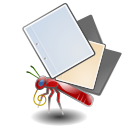The following are some tips that you might find helpful when creating your own flashcards. The advice is somewhat geared towards language learning flashcards, but could be useful for other fields as well.
- Make sure the answer of your flashcard is only a single piece of information. If the card asks you to recall multiple things at the same time, the card is doing double duty.
- Make sure there's enough relevant context for vocabulary. Rather than learning isolated words, prefer to use chunks or even sentences. That way you avoid using a word in
a wrong context - To reconcile the two previous points, make use of Mnemosyne's Sentence card type. E.g. if you put this in the 'Sentence' field: "La [casa:house] es [grande:big]", you'll get three sister cards with the following questions: "La casa es grande", "La [house] es grande", "La casa es [big]"
- Reviewing flashcards should only be a small part of your language learning activities. Make sure to have enough actual interaction with the language (listening, reading, speaking, writing, ...). Be aware that reviewing flashcards is a highly artificial activity, which does not always directly translate to actual language fluency.
- If you've been using Mnemosyne for long time, and your reviews pile up, don't hesitate to use the option to stop showing cards after they reach a number of successful repetitions, especially if you have lots of interaction with the language. If the words pop in your actual use of the language, that will act as a natural revision system. If they don't, then perhaps these cards were not relevant to begin with.
.
